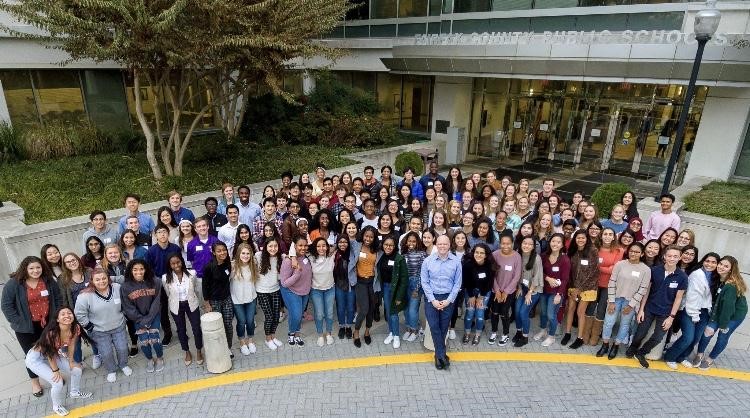FCPS policy now allows excused absence for civic engagement
Photo courtesy of Ryan McElveen
Ryan McElveen with the students he invited to attend his Student Advocacy and Innovation Workshop on November 15th. The workshop had guest speakers from the country and included helpful tips on student leadership.
December 18, 2019
The age of suppressed student voice is far over. Not just tolerance, but rather the encouragement of student activism is rising in FCPS. On December 1st, a new school board policy passed to allow students to have one excused absence per year for civic engagement.
“The idea grew out of the movement to end gun violence that was sparked last year by the Parkland students, who helped galvanize a generation to protest and speak out about gun laws within the United States. What we found was that, although FCPS has regulations that allow for absences for protests of political or other means, they were applied inconsistently from school-to-school,” said At-large school board member Ryan McElveen.
What “counts” as civic engagement would be events such as rallies, protests, advocating before elected officials, or any organized political event that gets approved. However, a prearranged absence form and proof of an organized activity is required for all events and students.
“[The civic engagement policy] gives students the ability to express their political views and be a part of the real world,” said junior Lexi White.
With a growing interest amongst young people to engage in politics and various movements, this policy is expected to become one that is quickly assimilated into student life.
“I would hesitate to speak on behalf of students. However, I believe that students are far more interested in environmental sustainability than the generations that came before them and understand that the choices that policymakers make today will have great impacts on the world they will inherit,” said McElveen. “Based on the interactions I have with students and the work I see them undertaking in our community, I believe students will embrace the ability to engage in the political arena, and I think they will be grateful to have had to opportunity as students to develop their advocacy skills when they need to use them later in life.
However, there is an opinion floating around the hallways that this acknowledgement of approved civic engagements days negates the point of student political activism in the first place.
“I feel like this is smart, but the whole point of the protest is to have that unexcused absence. It’s supposed to be showing your civil disobedience to the system, and to prove that there needs to be a change,” said senior Ian Krein.
At the end of the day, the excused absence will hopefully lead more students to feel empowered and push them to take advantage of the opportunity the county is encouraging.
“I think a lot of people around here will use the excused absence for political engagements. We are so fortunate to live close to DC, so why not use our voices for change,” said senior Kayla Rothstein.





